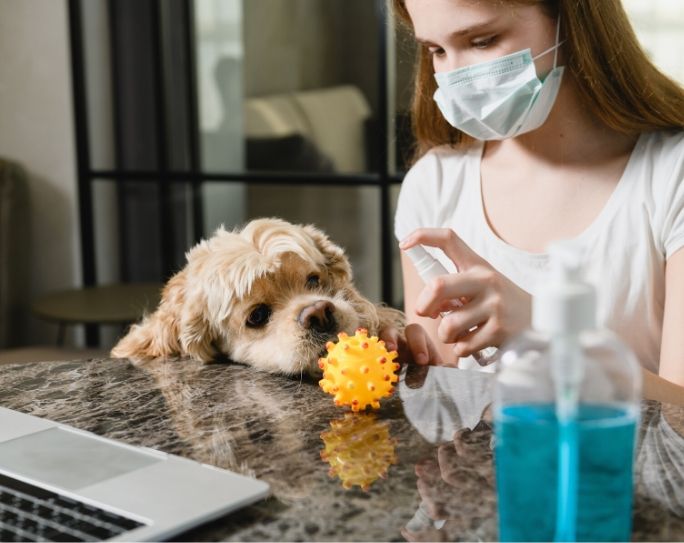5 Recommendations for Pet Sitting During the Pandemic this Summer
By Beth Stultz-Hairston | July 1, 2020

As many areas around the U.S. and abroad begin to lift stay-at-home (or similar) orders and travel restrictions, pet sitters and dog walkers are faced with new challenges. New pet-sitting requests may be starting to come in, but business owners must decide how to both safely offer services and generate enough revenue to sustain their businesses.
As you consider whether you should offer services, what precautions you should take and how to boost business this summer as the pandemic continues, PSI offers these recommendations.
1. Educate yourself on any local regulations. While pet-sitting and dog-walking services were deemed essential in most areas even while the most stringent stay-at-home orders were in place, it’s still a good idea to confirm that there are no state/provincial or local regulations that impact your ability to offer pet-care services where you live. Also be sure to research any other local regulations that may impact you or your business. For example, in North Carolina masks/face coverings are currently mandatory in public (as of 6/26/20). Other areas have adopted similar mandates.
2. Decide upon and implement specific COVID-19 safety protocols for your business. While stringent sanitation practices have always been part of professional pet sitters’ business practices, the ideas of “sanitation” and “pet-sitter safety” have taken on a much more detailed—and arguably much more vital—meaning in light of the current pandemic. PSI’s COVID-19 Certification Course for Pet Sitters and Dog Walkers can help assist you as you update your business practices, including your sanitation process at clients’ homes and ideas to make your initial consultations and pet-sitting visits as “contactless” as possible. PSI members, remember you have access to free COVID-19 protocol images to use on social media. Contact us if you need those images.
3. Re-evaluate your current service offerings. As a small-business owner, you decide which services you’d like to offer—or not offer. At PSI we have heard from some pet sitters who have opted to limit services at this time; some are not accepting new clients (only offering services to already-established clients) and others have decided to temporarily stop offering overnight visits to limit the amount of time they spend in others’ homes. We’ve also heard from some members with specific health concerns who have decided to temporarily stop services altogether. Should you have specific concerns about your vulnerability to COVID-19, consult with your physician.
Other PSI members, however, who feel comfortable offering services at this time have actually expanded their service offerings. For many, the pandemic forced them to “get creative” with their service offerings as clients began to work from home or cancel vacations. Services such as pet transportation, deep litter box cleans or playtime/enrichment visits can be important revenue generators, especially if your requests for vacation sits or daily dog walks have decreased.
4. Contact your current clients. Whether you had to temporarily close your business or never closed, once you’ve implemented COVID-19 safety protocols and determined which pet-care services you will currently offer, you should absolutely contact your clients. It doesn’t matter if they cancelled their vacations (and pet-sitting requests) in the spring or notified you that they would temporarily be working from home (and may not have needed your dog-walking services last month)—you should still reach out to them again. Highlight the services you are offering now and detail your safety protocols. Share about any new services you may be offering and remind them that you are also available for services if they are only taking a day trip or even just need a break while working from home. Your clients’ needs may change throughout the course of this pandemic, and it’s important you let them know that you are there to care for their pets—and that you are committed to offering services as safely as possible. Sending out an email to clients is likely the most efficient way to reach out, but depending on your client base (and how they prefer to receive communications), you may also consider mailing a letter, sending a text or even calling clients directly.
5. Ramp up your marketing and outreach efforts. If you are accepting new clients this summer, increasing your marketing efforts will be vital—but if you’re like many pet sitters who have been hit hard financially by the pandemic, you’ll likely be marketing on a shoestring budget. Fortunately, social-media platforms like Facebook provide free promotional opportunities. Promote your services and safety protocols with these free social-media images from PSI on your company’s Facebook or Instagram. Identify local Facebook groups (many neighborhoods, cities, etc. have Facebook groups to share community news) to join and share resources in. In many groups, “advertising” may not be allowed, but you can actively engage in group conversations and share helpful resources to raise awareness of your pet-sitting service. Facebook Live videos also generate more engagement on Facebook than other post types and can be an effective way for you to share your pet-care knowledge and gain new clients.
Partnering with other local businesses can also be a low- or no-cost way to promote your services to more local pet owners.
Consider these ideas:
- Reach out to local animal shelters or pet-rescue organizations. In many areas pet adoption has skyrocketed during the pandemic. Is there an opportunity for you to share information about your professional pet-care services with recent adopters? Likewise, can you share information on adoptable pets or the financial/product donation needs of your local shelters or pet rescues?
- Partner with other pet professionals. While pet professionals such as veterinarians and groomers are offering services (with many still implementing curbside/contactless drop off and pick up), they may find that some clients—particularly elderly clients or those in vulnerable populations—are hesitant to bring their pets for care. If you offer pet transportation, reach out to these local pet professionals to discuss how you can help by providing pet transportation to and from appointments.
- Look beyond pet-related businesses. While it’s important to network with other pet professionals, explore ways to also partner with other business types during this difficult time. Locally-owned restaurants have also been particularly impacted by the pandemic, and many are still relying on carryout or curbside pickup orders to help generate revenue. Perhaps you could provide a local restaurant with crayons and coloring sheets, like those offered in PSI’s Early Education Program, to include with takeout orders for families with children—and offer to promote their restaurant on your social-media pages or include their takeout menu in your new client packet or as a leave-behind on visits. Many libraries, who traditionally offer in-person summer reading programs, are relying on online activities to engage with patrons this summer. Offer to create a video highlighting best pet-care practices or sharing about your career as a professional pet sitter that your library can share as part of their summer offerings. It’s a simple way to support your local library while spreading the word about your business! With a little creativity and a lot of networking, you can find ways to partner with various businesses to support one another.
Have you added new business policies, procedures, or services due to the pandemic? What ways are you marketing your services to pet parents this summer? Comment below to share your experiences and ideas.







Comments
Karen Stoney
Karen Stoney